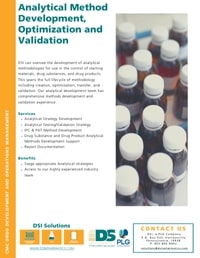Reliable Testing, Validation, and Regulatory Expertise for Pharmaceuticals and Biologics
Ensuring the quality, consistency, and compliance of drug substances, excipients, and finished products requires robust analytical methodologies. At DSI, we provide end-to-end analytical services spanning method development, validation, stability assessments, and regulatory support, ensuring that your drug development program meets global regulatory standards.
With an average of 30+ years of experience per consultant, our team has unparalleled expertise in analytical development, method qualification, impurity profiling, and regulatory filings for small molecules, biologics, biosimilars, orphan drugs, and veterinary pharmaceuticals.
Comprehensive Analytical Services
Method Development & Optimization
Analytical methods must be robust, accurate, and regulatory-compliant to ensure reliable product testing. DSI’s Analytical Development Team has extensive experience designing and optimizing fit-for-purpose methodologies across various dosage forms, active ingredients, and impurity assessments.
- Expertise in diverse active ingredients – Small molecules, peptides, proteins, oligonucleotides, and biologics.
- Method development for various dosage forms – Tablets, capsules, oral solutions, lyophilized and liquid injectables, inhalation, soft chews, semi-solid gels, nasal sprays, and liposomes.
- Comprehensive impurity profiling – Residual solvents, nitrosamine risk assessment, elemental impurities, and degradation products.
- Chromatographic & bioanalytical methods – HPLC, UPLC, GC, LC-MS, and bioanalytical assays for PK/ADME studies.
- Forced degradation & stability trend analysis – Ensure long-term product stability and shelf life under ICH/VICH
- Dissolution & bioequivalence studies – Support solid oral dosage form optimization and regulatory acceptance.
Method Qualification & Validation
Ensuring analytical method reliability is critical for regulatory acceptance and commercial success. DSI’s experts perform method validation, transfers, and qualification studies that align with FDA, EMA, ICH, and VICH guidelines.
- Method validation per compendial/ICH/VICH requirements – Accuracy, precision, specificity, robustness, and linearity.
- Method transfers between CDMOs – Ensure reproducibility and compliance across multiple testing sites.
- Compendial monograph verification – Qualify USP, EP, JP, and other pharmacopeial methods.
- Method equivalency studies – Replace compendial methods with superior in-house alternatives.
- Bioanalytical method validation – Support clinical pharmacokinetics, biomarker studies, and toxicology programs.
Investigations & Data Evaluations
Unexpected analytical results can delay drug development and regulatory approvals. CDMOs often lack the expertise to thoroughly investigate data anomalies, leading to quick but incomplete resolutions. At DSI, we specialize in data-driven root cause analysis, working closely with analytical labs, manufacturing teams, and regulatory agencies.
- Out-of-Specification (OOS) & Out-of-Trend (OOT) investigations – Identify root causes and implement corrective actions.
- Impurity isolation & characterization – Determine newly occurring degradants and their impact.
- Stability data interpretation – Establish scientifically justified product shelf life.
- Elemental impurity, nitrosamine & genotoxic risk assessments – Ensure compliance with ICH Q3D and EMA standards.
- Extractables & leachables evaluation – Assess risks in parenteral and inhalation drug products.
Regulatory Support for Analytical Submissions
Regulatory approval requires precisely presented analytical data that demonstrates product stability, impurity control, and manufacturing consistency. DSI’s regulatory specialists craft submission-ready analytical reports and respond to agency inquiries with science-backed justifications.
- Technical review of analytical sections in IND, NDA, BLA, ANDA, and JINAD submissions.
- Characterization & impurity qualification assessments – Demonstrate product safety and degradation mechanisms.
- Justification of drug substance & product specifications – Align manufacturing process capability with regulatory expectations.
- Control strategy development – Define product-specific impurity limits, extractables/leachables profiles, and stability parameters.
- Regulatory query responses & complete response letter (CRL) support – Address FDA and EMA analytical concerns effectively.
Why Choose DSI for Analytical Services?
✓ Industry-Leading Expertise in Analytical Development
Our team has decades of hands-on experience developing, validating, and troubleshooting analytical methods for complex pharmaceutical and biologic products.
✓ Regulatory-Ready Data Packages
We ensure your analytical reports, stability data, and impurity justifications align with global regulatory expectations, minimizing approval delays.
✓ Seamless Integration with CDMOs & Testing Labs
We work directly with your contract manufacturers and QC laboratories, ensuring method transfers, data consistency, and compliance.
✓ Proactive Problem-Solving Approach
From OOS investigations to stability failures, we identify root causes and implement corrective actions before they impact regulatory filings.
Ensure Analytical Excellence with DSI’s Expertise
Looking for reliable analytical method development, stability assessment, or regulatory support?
Contact us today to discuss your analytical challenges and how we can help you achieve regulatory success.



